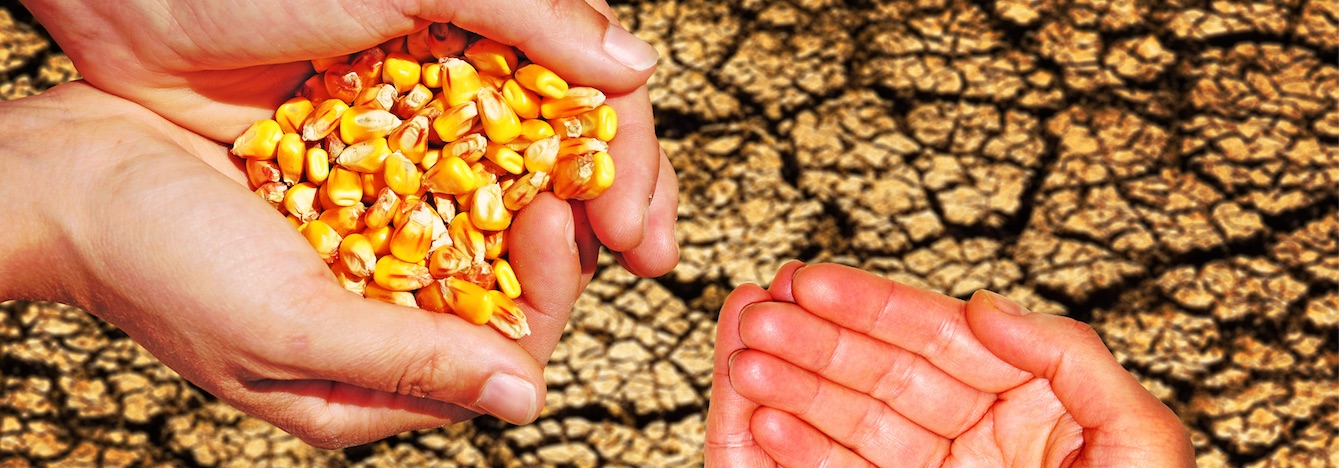Averting global food crises by reducing waste and finding new food sources
Nine billion people will need feeding in 2050 – requiring improved access to more food, produced more sustainably. Alarming food insecurity worldwide was one of the world’s top five risks identified by the Global Opportunity Report 2016: unsustainable diets, inefficient production and storage techniques, and immense worldwide wastage. As innovative solutions become more urgent, the report highlights opportunities arising from those risks: reducing waste; promoting sustainable diets; and optimising farming practices.
Opportunity 1: Reducing food waste
All the world’s hungry people could eat if we saved one-quarter of the food we currently waste. By harnessing renewable energy to refrigerate food after harvest, we could save some of the 30-40% lost before reaching market in developing countries. Fixing the “cold chain” renewably could reduce the food industry’s footprint, while reducing food and water loss to feed more people. Producers could sell more of their total food, and retailers would enjoy more stable supplies of higher-quality products, while saving on energy-efficient refrigeration.
In developed countries, most food waste is from consumers or distribution and marketing practices – up to 60% wasted in restaurants or at home – creating an opportunity to reduce waste at the consumption point. Businesses and governments can incentivise customers and retailers to purchase and sell responsibly through innovative packaging practices, smart labelling allowing products to stay on shelves for as long as they are fresh, and campaigns to change perceptions of wasteful retailing and irresponsible consumption.
Sustainability Victoria’s Love Food Hate Waste campaign aims to raise awareness about avoidable food waste from Victorian households.
Victoria’s Waste to Energy Infrastructure Fund, is a $2 million initiative aiming to generate energy from organic waste, reflecting one potential for organic waste:
In 2014-15 Victoria’s commercial and industrial sector produced more than 300,000 tonnes of food waste of which only 22% was recycled.
Organic waste, when sent to landfill is initially decomposed by microorganisms that produce the greenhouse gas carbon dioxide. Over time, the oxygen in the landfill is depleted and different microbes continue the decomposition process generating methane, a greenhouse gas that is at least 21 times more potent than carbon dioxide in our atmosphere, trapping heat and contributing to climate change.
Opportunity 2: New diets
Alternative diets present an opportunity to move from inefficient, unhealthy and unsustainable eating habits. Industrial animal farming is highly inefficient: 70% more calories would be available if crops which feed animals instead fed humans directly. The world consumes more meat every year. Businesses have the opportunity to present consumers with more sustainable, energy-efficient and healthy protein sources than meat, including plankton, insects, seaweed, and protein-rich plants.
Retailers, governments, and schools can also change ideas about how food should look, as up to 30% of some crops are discarded because retailers don’t believe consumers will find them edible.
Opportunity 3: Smart farming
Technology allows farmers to optimise output, find new customers, and overcome spatial limitations in cities. Access to weather data allows small-scale farmers to increase productivity, while new communications access gives them greater marketplace clout as they contact previously unreachable customers.
With rising prices for inputs like water and fertiliser, and state regulations on how much of those inputs farms can use, farmers are also getting smart. “Precision farming”, or using technology to map and optimise crop outputs, has provided an 18% annual increase in profits for farmers. Sixty percent of farmers believe this practice will become the norm as technology advances.
Overcoming spatial limitations in city environments can improve food security in some of the world’s poorest locations. Urban agriculture produces 15-20% of the world’s food, and so techniques like vertical food production on the sides of buildings, and urban precision farming, help small farmers improve competitiveness while providing a growing urban populace with fresher produce.
Where to?
Global food insecurity confronts consumers, businesses and governments with a profound challenge. As the scale of the problem grows, there are more opportunities to change mindsets, consumption practices, production processes, and uses of technology. It is within the capabilities of global society, working together, to pursue sustainable, efficient, and socially conscious international food security.
A participant in the UN Global Compact, CourtHeath seeks to raise awareness about the Sustainable Development Goals and the principles of the Global Compact with business and government organisations in Victoria.
* * *
IMAGE: Used under licence from shutterstock.com
 CourtHeath Consulting
CourtHeath Consulting CourtHeath Consulting
CourtHeath Consulting